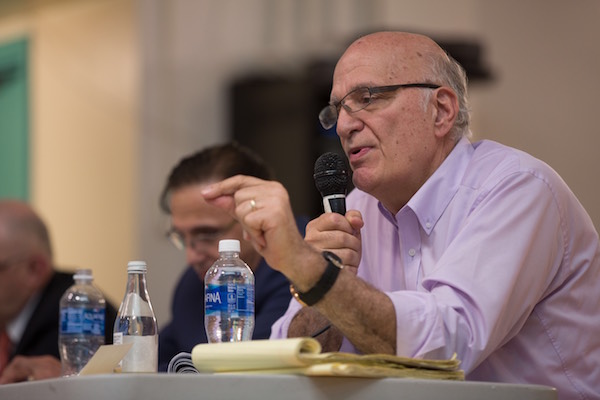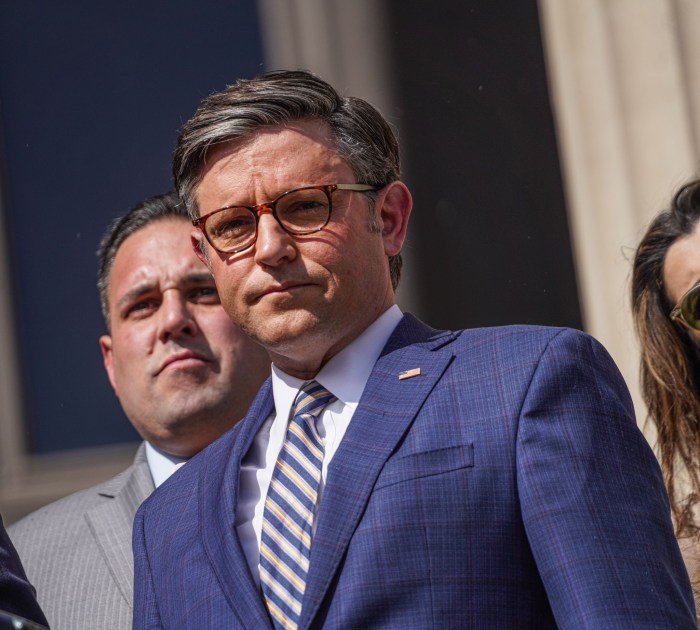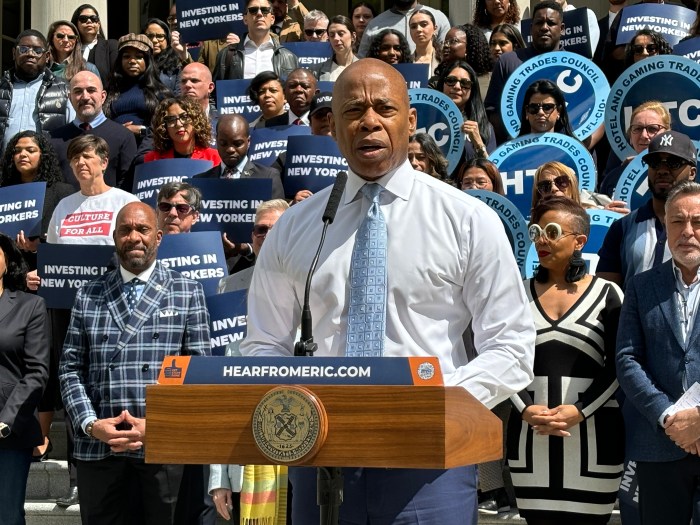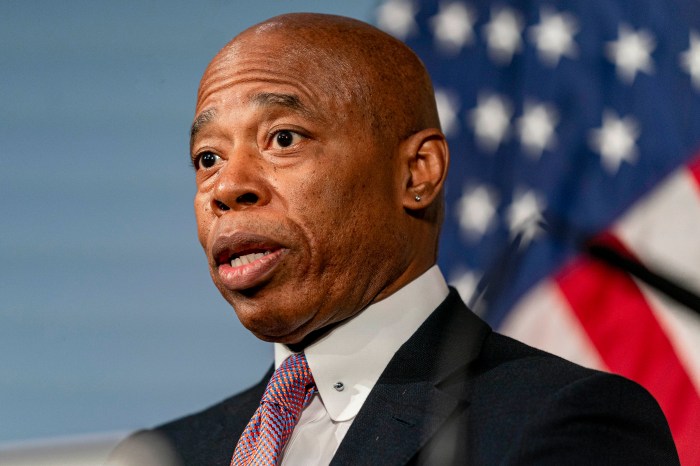
BY NATHAN RILEY | Despite continued criticism of Bill de Blasio from police unions and other law and order advocates — his skipping the July 8 South Bronx vigil for slain Police Officer Miosotis Familia because of his presence at G20 Summit protests in Hamburg being only the most recent occasion — disappointment on the left over the mayor not moving more aggressively on criminal justice reform is animating one candidate who hopes to challenge him in the September 12 Democratic primary.
Upper West Side reformer Bob Gangi is mounting a deeply personal — though likely quixotic — campaign against the incumbent over policing issues.
Having spent a lifetime in criminal justice reform, Gangi said his doubts about the mayor began when he appointed Bill Bratton as his police commissioner shortly after his 2013 election. It was Bratton’s second time at the helm of the NYPD; his first was with Mayor Rudy Giuliani and marked the beginning of the “stop and frisk” era in New York policing.
Gangi, 73, is not shy about offering his opinions, and central to his outlook is the view that the constant questioning of youth of color amounts to aggression against the community. He pledges an administration that would redress the past wrongs of such heavy-handed law enforcement.
In a typical fiery outburst recently emailed to his supporters, Gangi wrote, “END ABUSIVE & DISCRIMINATORY POLICING — ** On DAY 1, I will send a directive to the city’s police chief to immediately dismiss all the officers whose reckless & irresponsible actions led directly to Eric Garner’s death.”
He also promised to immediately order the NYPD to end the “quota system” that drives many officers to cite people for minor offenses. Acknowledging the likelihood of police resistance to his reform efforts, Gangi said he would enforce his directive by monitoring the arraignments in city courts to determine who is being arrested and for what offenses. He has called for “summarily dismissing” any officers who makes arrests for offenses like marijuana possession, open containers, and loitering for the purposes of prostitution.
Summarizing what his election would mean, Gangi said it would reflect nothing less than that “the days when the NYPD inflicted harm & hardship on vulnerable New Yorkers are over.”
Gangi is, to be sure, no novice when it comes to law enforcement issues. For 29 years, he ran the Correctional Association of New York, a non-profit empowered by the Legislature 173 years ago to inspect prisons. It is the only non-governmental group in the state that enjoys unrestricted access to correctional facilities.
After leaving the Correctional Association, Gangi joined the Police Reform Organizing Project, a group that advocates for thoroughgoing changes in NYPD practices on behalf of communities of color and low-income and LGBTQ New Yorkers. He is on leave from PROP while he he campaigns for mayor.
Gangi’s candidacy is born of his belief that even with stop and frisk incidents down dramatically from their heights in the Bloomberg years, de Blasio has maintained other key components of “broken windows” policing, leaving poor people with criminal records and immigrants vulnerable to deportation under the Trump administration’s aggressive efforts.
Citing a new report from the Drug Policy Alliance that New York City made 18,136 marijuana arrests in 2016, a nearly 10 percent increase over the prior year, Gangi, in a recent statement, wrote that trend “puts the lie to the mayor’s repeated & baffling claims that the NYPD has ended marijuana possession arrests, when in reality such arrests are the Department’s 4th most common arrest.”
Gangi’s campaign is not focused exclusively on policing questions. Among other radical ideas he is pushing are free subway and bus rides for low-income New Yorkers and a significant change in how affordable housing is defined.
Under the current administration, affordability is measured according to the citywide median income of just over $50,000. In a recent interview in a Bushwick bar where Gangi was meeting with a largely youthful crowd of supporters helping his signature-gathering push to win a spot on the September 12 primary ballot, he explained that affordability, under his administration, would be indexed to the neighborhood where new housing is being constructed. In many parts of the city, that figure is closer to $24,000 than to $50,000. Affordability geared to those household incomes, he said, would stall gentrification and stabilize neighborhoods.
Gangi also talks about ambitious ideas like ending the de Blasio zoning changes that encourage high-rise residential construction. Affordable housing, he said, should be built by local residents, schools should ensure smaller class sizes, and “homes for the homeless” rather than proliferating shelters should be the aim of housing policy.
Gangi’s campaign is clearly a labor of love, funded in good measure with the savings he and his wife Barbara, a psychotherapist, have collected over 48 years of marriage. There is no professional campaign manager, and it was only by talking to another Democratic mayoral hopeful, former Brooklyn City Councilmember Sal Albanese, at a candidate’s forum, that he learned that contenders for high city office typically hire people to collect signatures. As the July 13 signature deadline nears, Gangi, backed instead by volunteer enthusiasm, is struggling mightily to collect the 3,750 signatures city law requires for him to get on the ballot. And with no election lawyer on retainer, even should he reach that total, Gangi could run afoul of a contradictory state requirement that he gather twice that number of signatures.

















